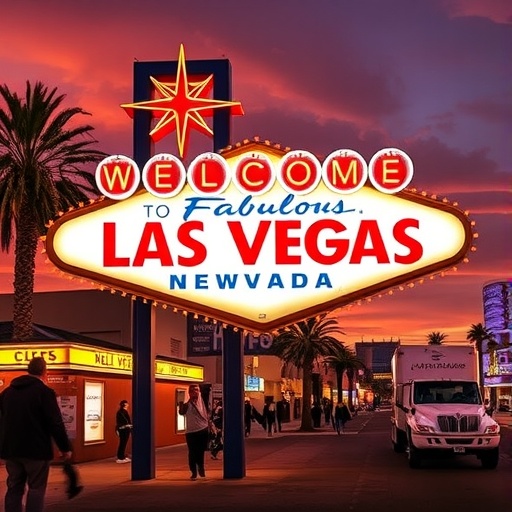Las Vegas Emerges as Premier Film Production Hub Amid Hollywood’s Ongoing Slump
In a stunning shift that’s sending shockwaves through the entertainment industry, Las Vegas is rapidly transforming from a city of neon lights and slot machines into a bustling epicenter for film production. As Hollywood grapples with production halts, skyrocketing costs, and labor disputes, Nevada’s Sin City has lured major studios with generous tax rebates and diverse filming locations, positioning itself as the go-to alternative for filmmakers seeking efficiency and innovation.
This surge isn’t just a blip; recent data from the Nevada Film Office reveals that film production permits in Las Vegas have spiked by 45% year-over-year, outpacing even pre-pandemic levels. With blockbuster projects like a high-profile action thriller and an indie drama already shooting on the Strip, the city is proving that what happens in Vegas is increasingly making it to the silver screen—and boosting the local economy in the process.
Hollywood’s Production Woes Drive Studios to Seek New Horizons
The once-unrivaled dominance of Hollywood in the entertainment industry is facing its toughest challenge yet, with a confluence of factors creating a perfect storm for film production slowdowns. The 2023 Writers Guild of America strike, followed by the SAG-AFTRA actors’ strike, paralyzed major studios for months, leading to an estimated $5 billion loss in California alone, according to a report from the Motion Picture Association. Even as labor tensions ease, the aftermath lingers: inflated budgets due to higher wages, regulatory hurdles from new environmental and diversity mandates, and a post-COVID backlog that’s overwhelming soundstages in Los Angeles and Burbank.
“Hollywood’s infrastructure is creaking under the weight of its own success,” says entertainment analyst Dr. Elena Ramirez, a professor at UCLA’s School of Theater, Film and Television. “Studios are looking for places where they can shoot faster, cheaper, and without the bureaucratic red tape. That’s where Las Vegas steps in—it’s like a breath of fresh air for an industry that’s been holding its breath.”
Statistics paint a grim picture for California. The California Film Commission reported a 30% drop in on-location shooting days in 2023 compared to 2019, with high-profile projects like Netflix’s “Stranger Things” seasons facing delays due to venue shortages. Meanwhile, rising real estate costs in Los Angeles have pushed average daily production rates up by 25%, making alternative hubs irresistible. Enter Las Vegas, where the Nevada legislature expanded its film tax credit program in 2022, offering up to 30% rebates on qualified expenditures—far more competitive than California’s capped 25% incentive.
This exodus isn’t limited to independents; even giants like Warner Bros. and Paramount have scouted Las Vegas locations. A recent Variety survey of studio executives found that 62% are actively considering out-of-state options for future projects, citing Hollywood‘s logistical nightmares as the primary deterrent. As one anonymous producer told Deadline, “We’re tired of the traffic jams on set—literally and figuratively. Las Vegas offers 24/7 access without the drama.”
Las Vegas Unlocks Iconic Locations and Incentives for Filmmakers
What makes Las Vegas such a magnet for film production? Beyond the financial perks, the city’s landscape is a director’s dream, blending urban glamour with desert ruggedness in a way few places can match. From the glittering casinos of the Strip to the stark beauty of the nearby Red Rock Canyon, Las Vegas provides a versatile backdrop that can double as futuristic cities, high-stakes heists, or post-apocalyptic wastelands—all within a short drive.
The Nevada Film Office has been instrumental in this transformation, streamlining permitting processes to under 48 hours for most shoots. “We’ve invested in modern soundstages and green screens at facilities like the Las Vegas Production Center, which rivals anything in Hollywood,” explains Director of the Nevada Film Office, Geordie Arnold. “Our incentives aren’t just rebates; they’re a full-service package including workforce training programs that have upskilled over 2,000 locals in film crafts since 2020.”
Take, for instance, the recent buzz around a Marvel Studios spin-off project rumored to be eyeing the Sphere at The Venetian for key scenes. The venue’s immersive LED dome could revolutionize visual effects, offering cost savings of up to 40% compared to CGI-heavy Hollywood productions. And it’s not all glitz; the surrounding Mojave Desert has hosted gritty Westerns and sci-fi epics, with productions like the 2024 indie hit “Neon Shadows” crediting Las Vegas‘s natural light and minimal light pollution for authentic night shoots.
To illustrate the appeal, consider this breakdown of Las Vegas‘s advantages:
- Tax Incentives: Up to 30% cash rebates, with no cap on total funding—unlike California’s lottery system.
- Location Variety: Urban, desert, and luxury interiors, reducing travel costs by 50% for multi-site shoots.
- Skilled Labor Pool: Partnerships with UNLV’s film program have created a ready workforce, cutting hiring times in half.
- Infrastructure Upgrades: New fiber-optic networks and mobile production units ensure seamless streaming for remote oversight.
These elements have already attracted over $150 million in film production investments in 2024, per state economic reports, signaling a seismic shift in the entertainment industry.
Major Studios Flock to Las Vegas for Blockbuster Shoots
The proof is in the footage: Las Vegas is no longer just a cameo player in films; it’s becoming a starring destination. In the past year, several high-caliber projects have set up shop, drawing A-list talent and generating headlines that rival Hollywood‘s own.
Leading the charge is Universal Pictures’ untitled action franchise sequel, which began principal photography on the Las Vegas Strip in March 2024. Starring a top-billed action star, the film utilizes the Bellagio Fountains for a climactic chase scene, with production wrapping key sequences in record time thanks to the city’s efficient traffic controls. “Las Vegas gave us the energy we needed—it’s alive in a way L.A. sets just aren’t anymore,” gushed director Mia Chen in an on-set interview with The Hollywood Reporter.
Not to be outdone, A24’s psychological thriller “Desert Echoes” wrapped filming in the Valley of Fire State Park last month, praising the location’s otherworldly rock formations for adding authenticity without expensive set builds. The project, which secured a $4.2 million tax rebate, employed 150 local crew members and is projected to premiere at Sundance 2025, further elevating Las Vegas‘s profile in the indie film production scene.
Even international productions are taking notice. A Bollywood epic from Yash Raj Films scouted Las Vegas for its lavish song sequences, blending the city’s vibrant nightlife with traditional dance numbers. This crossover highlights how Las Vegas is diversifying the entertainment industry, attracting global talent and fostering collaborations that Hollywood might envy.
Quotes from industry insiders underscore the momentum. “We’re seeing a 70% increase in inquiries from Hollywood studios,” notes Las Vegas Convention and Visitors Authority spokesperson Lisa Carter. “These aren’t small gigs; we’re talking tentpole films that could redefine how movies are made.” With more announcements expected by year’s end, Las Vegas is solidifying its role as a production powerhouse.
Las Vegas Film Boom Supercharges Tourism and Local Economy
The ripple effects of this film production influx extend far beyond celluloid, intertwining with Las Vegas‘s core identity as a tourism mecca. As crews and stars descend on the city, hotels, restaurants, and attractions are reaping the rewards, creating a symbiotic boost for the entertainment industry.
Economic impact studies from the University of Nevada, Las Vegas (UNLV) estimate that each major film production generates $10-15 million in direct spending on lodging, catering, and transportation. For 2024, this translates to a projected $300 million windfall, with tourism officials reporting a 12% uptick in visitor numbers during peak shooting seasons. Fans flock to glimpse sets, turning filming sites into impromptu attractions—much like how “The Hangover” trilogy immortalized the Caesars Palace pool.
“This is a game-changer for our tourism sector,” says Las Vegas Mayor Shelley Berkley. “Film crews bring buzz that lasts long after wrap parties. We’re seeing sold-out shows at residencies and increased bookings at iconic spots like the High Roller observation wheel, all tied to the glamour of on-location shoots.”
Local businesses are adapting swiftly. The Las Vegas Film Festival, now in its 10th year, has expanded to include behind-the-scenes tours of production hubs, drawing 20,000 attendees last season. Meanwhile, vocational programs at the College of Southern Nevada are churning out grips, gaffers, and editors, reducing unemployment in creative fields by 8% since the incentive program’s launch.
Yet, challenges remain. Environmental groups have raised concerns about desert ecosystem impacts from large-scale shoots, prompting the Nevada Film Office to implement sustainable practices like zero-waste policies. Still, the net positive is clear: Las Vegas‘s film production renaissance is revitalizing the entertainment industry while reinforcing its tourism allure, creating jobs and cultural cachet that could sustain the city for decades.
Looking ahead, Las Vegas is poised to capture even more market share from a faltering Hollywood. With proposed expansions to the tax credit program on the legislative docket for 2025 and new partnerships with streaming giants like Amazon MGM Studios, the city could host over 50 major productions annually by 2027. Industry forecasts from PwC predict that non-traditional hubs like Las Vegas will account for 25% of U.S. film production by the end of the decade, driven by technological advancements such as AI-assisted editing and virtual production stages being piloted in Nevada facilities.
As one studio executive put it to Forbes, “Hollywood had its run, but Las Vegas is the future—bold, efficient, and ready for its close-up.” With ongoing investments in education, infrastructure, and green initiatives, the Silver State is not just surviving the entertainment industry shake-up; it’s thriving, inviting filmmakers worldwide to roll the dice on a new era of cinematic innovation.








